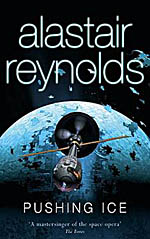
![]() attackofthebooks
attackofthebooks
3/21/2017
![]()
Forty years from now, we have stepped out into the solar system, mining the asteroids and salvaging ice from comets to provide resources for humanity's expansion. Then, in a moment, the moon Janus, one of Saturn's ice moons, begins to leave first the orbit of the gas giant and then to chart a course out of the solar system...all without showing any sign of the machinery it has hidden carefully for millennia. The Rockhopper, an ice miner captained by Bella Lind, is the closest spacecraft to the rapidly accelerating moon, and it is sent in hot pursuit as Janus aims for a giant structure, light minutes long and centuries away. Then, before Rockhopper can veer away, it is sucked into the vortex created by Janus' subterranean space drive and its crew is shanghaied for an interstellar journey.
I picked up Pushing Ice on the heels of finishing Reynolds' Hugo Nominated short story Slow Bullets. I'm not sure why I chose Pushing Ice, except that perhaps it was what I could find quickly from the library. Regardless, it immediately gripped me, and I read it quickly. Reynolds seems to have a thing for alien artifacts and their impact on unwitting humans. Slow Bullets deals with a mysterious alien prism that crosses all of human space, minutely changing space to send humanity into a dark age. Revelation Space is about an archeological investigation into the destruction of an entire civilization 9000 years ago and why it might happen again. And in Pushing Ice, we find the crew of the Rockhopper transported by near magical means (See "Clarke's Third Law") to a megastructure so large that entire alien civilizations exist within it...and not always peacefully.
As the members of the crew of the Rockhopper become the denizens of Janus, they face conflict and tragedy and must develop the means of surviving with scarce resources and a limited gene pool. Months become years and then decades. Personalities clash, and the impact of grudges carry over into the tiny society the develops megastructure where Janus has taken them. Reynolds has an eye for creating intriguing conflicts, posing questions that are not easily answered. The result is wonder filled.
And yet, there are problems. In such a small society, Reynolds sees humanity as rigid and inflexible, vengeful and impulsive. Grudges are held for years, even when keeping them is cruel and inhuman. Politics in such a small group are unlikely to remain static, and yet only two powers ever rise, and they manage to hold on to control without any real challenge over a period of decades. I just didn't see how society -- especially one that is necessarily insular due to its isolated nature -- could be so myopically narrow. Could it be, though? Sure, and maybe that's why I could suspend disbelief, even when deus ex machine swooped in to maintain the narrow set of powers Reynolds had set as primary in his story.
Pushing Ice is a fantastic story, a hard science fiction propped up in decidedly non-science struts like resurrection, physical regeneration, near light speed travel, and a machine that can make anything from scratch. Pretty cool stuff, and when combined with the interesting conflicts Reynolds creates, it makes for a cool story.
http://www.attackofthebooks.com/book-review-pushing-ice-alastair-reynolds/